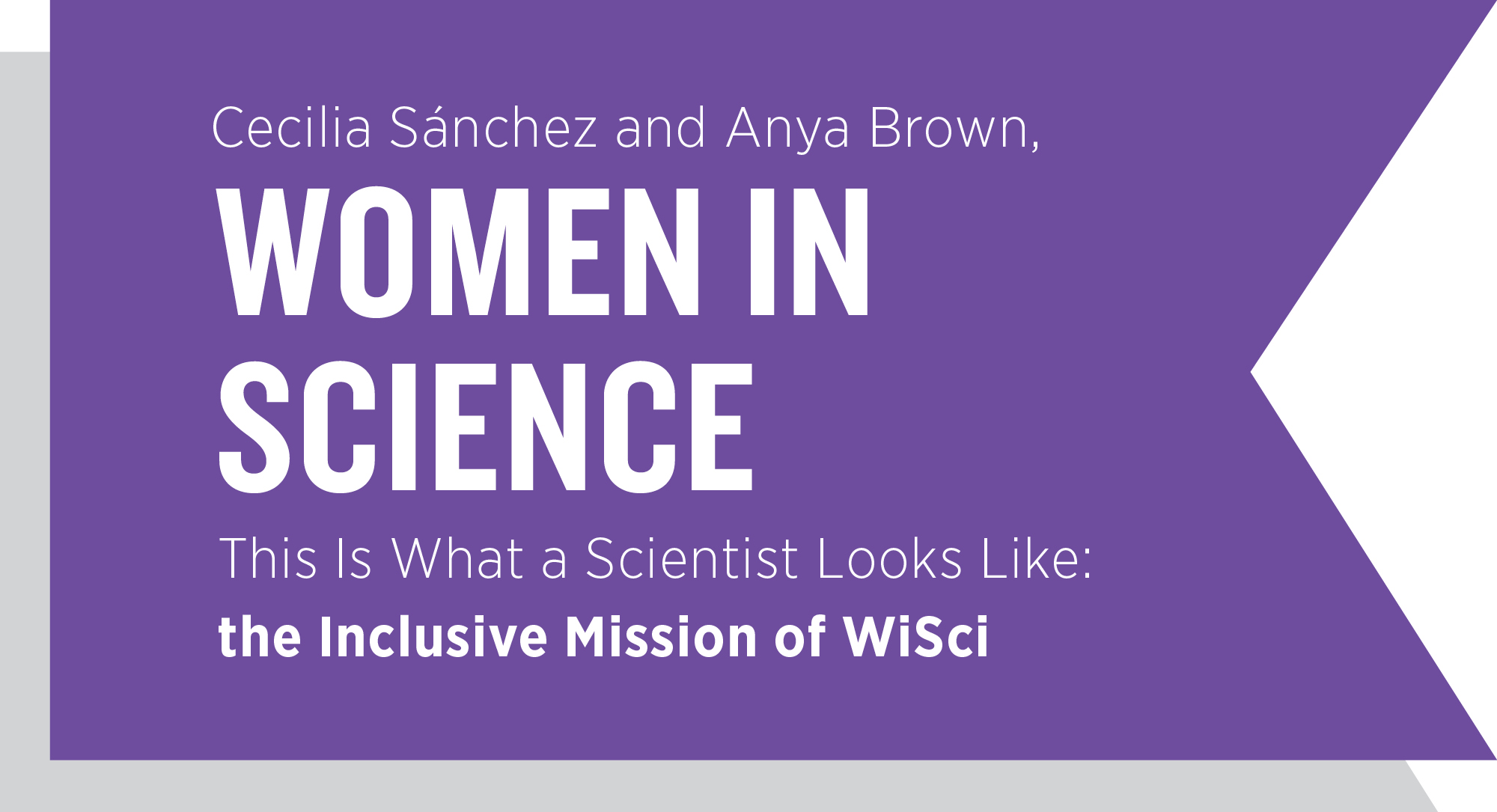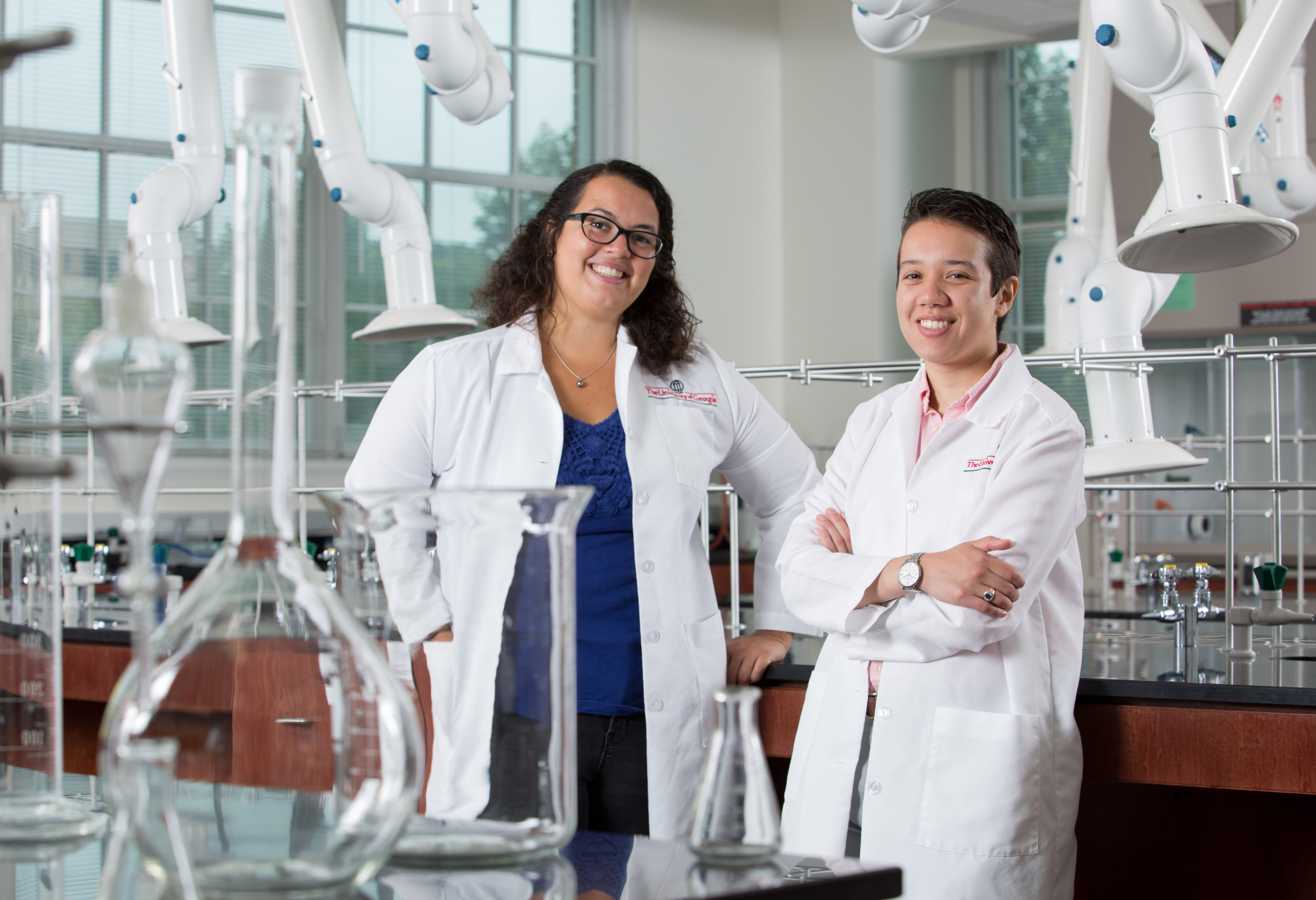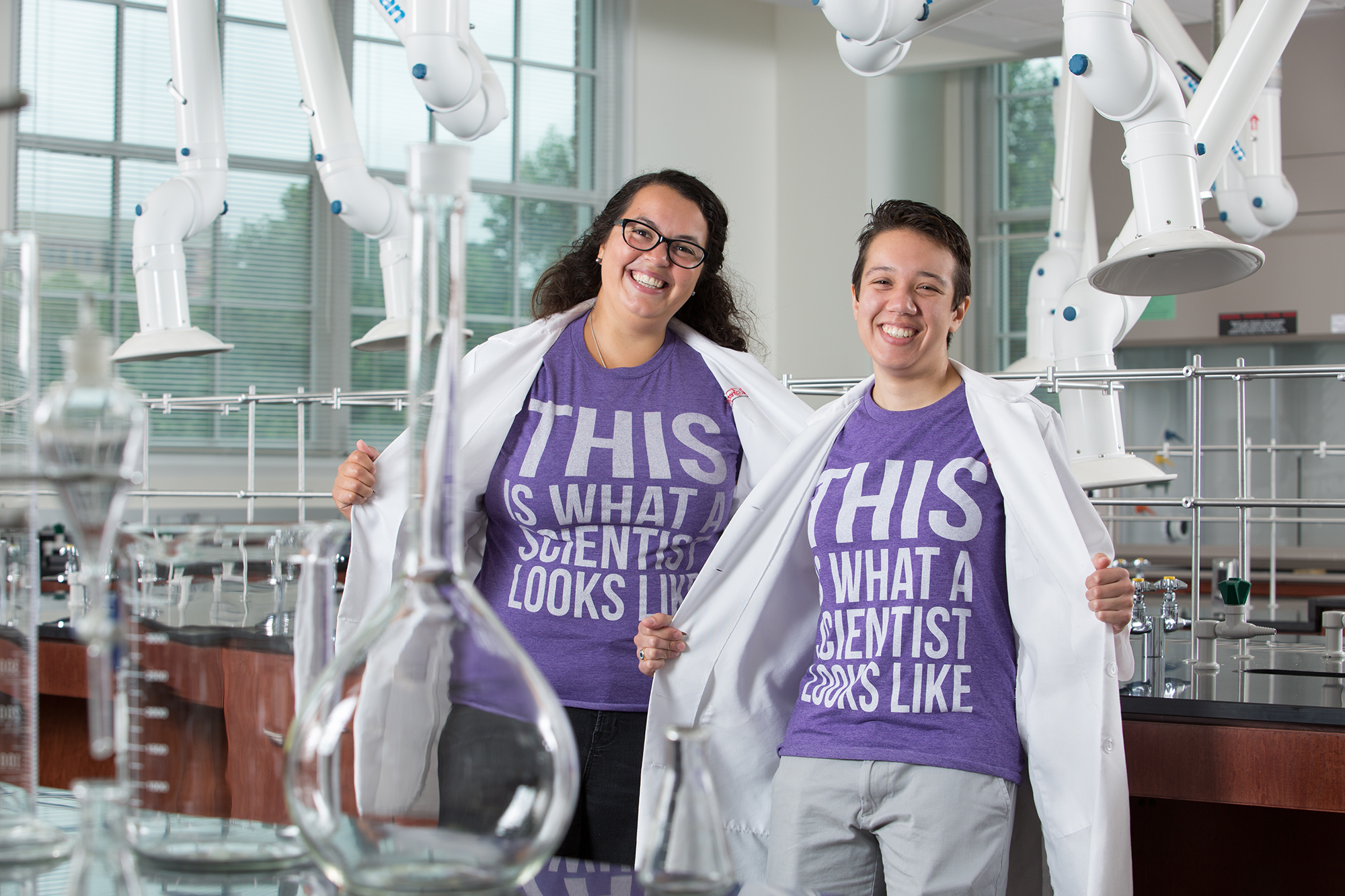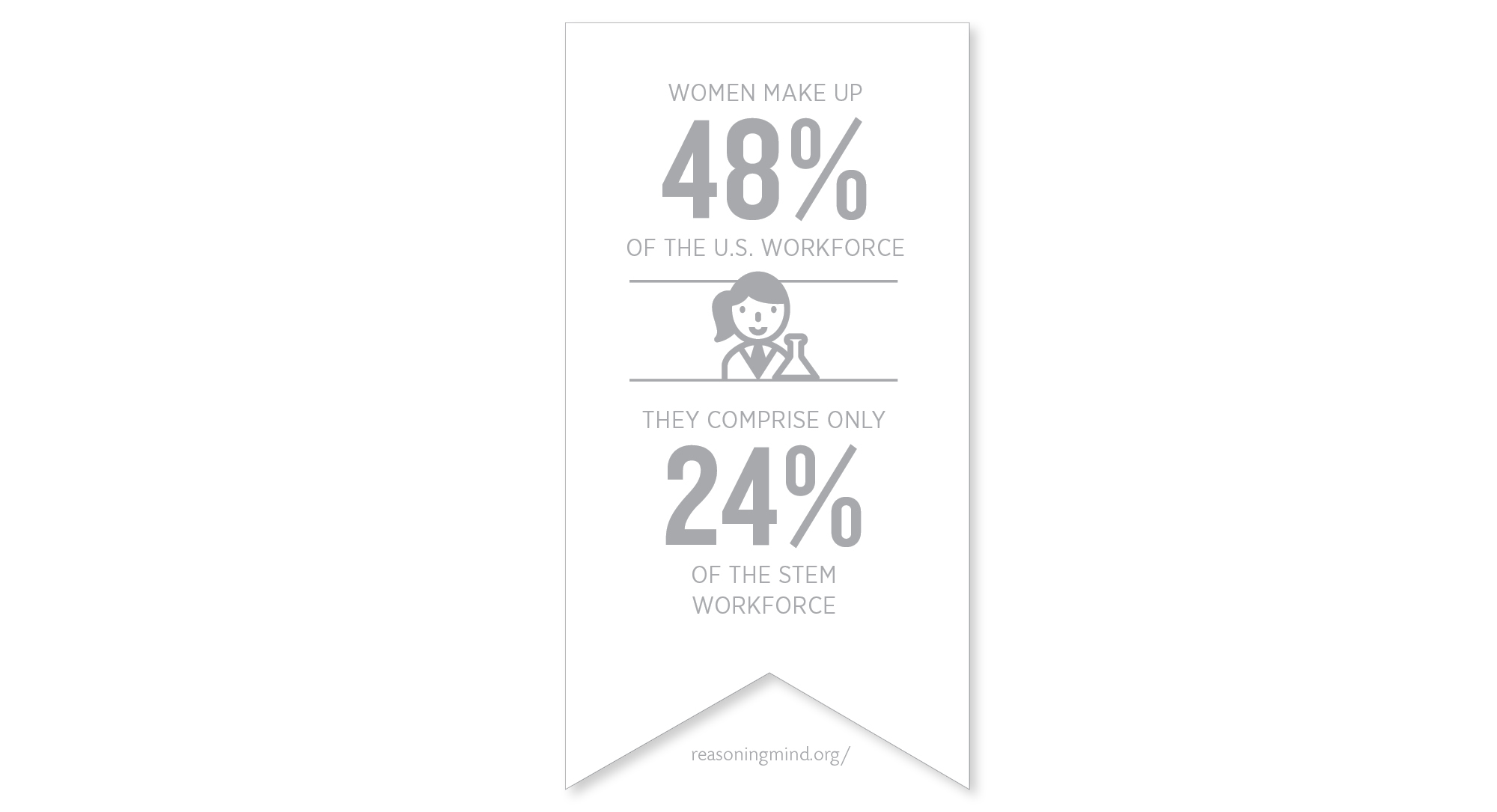Cecilia Sánchez and Anya Brown, Women in Science

By: Cynthia Adams | Photos By: Nancy Evelyn
Cecilia Sánchez and Anya Brown came from different parts of the country and different institutions, and yet were swiftly united by science, fellowship, and their mutual pursuit of doctorates in ecology. The pair of scientists bonded as women in science, the namesake of the thriving organization, Women in Science, or WiSci, which they founded at UGA three years ago. They formalized their past experiences at other schools and kick-started a group that has expanded in size thanks to an inclusive mission, defined purpose, and savvy social media.
Today, Women in Science is a growing organization that is a force for positive change, with discussions and leadership-oriented events. They offer mentoring, professional development, and networking for those in scientific fields—but theirs is a big tent with room for all, the founders stress. Despite the name, both women and men are welcome. One of the group’s first officers was a man, Daniel Baker, says Sánchez.
They seek to add diverse voices to the conversation of equality and allow all who are interested to be engaged advocates. “You may have a man mentoring a woman,” point out Sánchez and Brown, emphasizing the importance of involving “all who are energized to boost women in science.”
In an interview with UGA Graduate magazine, Brown said WiSci began when she and Sánchez held an information and organizing session three years ago. Although the fledgling group only included seven fellow graduate students in 2014, WiSci swiftly grew and attendance at any particular event expanded. “We now have over 300 members,” says Sánchez, “from the last time I checked the listserv. That includes everyone who receives our emails; people can also follow us on our social media accounts.” Adds Brown, “The way you participate in WiSci is open and flexible.”

Women in Science founders Anya Brown, Cecilia Sanchez shown inside the Science Learning Center.
Their members can choose what they are most interested in and opt into varied WiSci levels of involvement.
WiSci holds general body meetings on UGA’s campus, and smaller, informal discussions at Highwire Lounge at 269 N. Hull Street in Athens. For the smaller WiSci meetings, they keep discussions topical, often reading a paper or blog post beforehand. By example, Sanchez mentions a popular discussion topic, the imposter syndrome. (The syndrome refers to an outwardly successful, accomplished person privately feeling like a fraud.) “Continued discussions about the imposter syndrome and combating the imposter syndrome are still relevant,” says Brown. “Imposter syndrome never goes away. It’s an important talk to have. At least, it is being recognized.”
In addition to the member-led discussions, WiSci branches out into the public in order to expand their reach. The group hosts brown-bag lunches, inviting speakers from different departments, and creates outreach events with young students at Clarke Central High School. WiSci established a formal mentoring program with a tiered approach—graduate students can mentor undergraduates, and also receive mentorship in turn from postdocs and faculty.

WiSci started with seven fellow graduate students in 2014 and has over 300 members today.
Interested in WiSci?
The mechanics are simple. To become involved, Sánchez and Brown suggest, “The best way to find out what is going on is to send an email to wisciuga@gmail.com and ask to be added to our listserv.” Announcements for events are sent through the listserv and WiSci’s Facebook, Twitter, and Instagram accounts.
Brown adds that although WiSci is geared to those in STEM (science, technology, engineering, and math) fields, “It is open to anyone, including those in the social sciences.” As a fundraising effort, and to show the diversity of scientists at UGA, WiSci sold tee shirts imprinted with, “This is What a Scientist Looks Like.”
The tee shirts sold out. Other fundraiser efforts are planned, likely in the fall.
Sánchez says, “We err on the side of inclusion.” Inclusion is an important aspect of the WiSci mission. Sánchez believes that the growth of Women in Science “means there is a need on campus for what we provide, which is a three-prong system (of support) for female scientists. Our mission is to promote equality in the sciences through mentoring, career development, and networking opportunities. Those are the three core components we try to design events around.”
In November 2015, supported by funding from the UGA Parents and Families Association, WiSci hosted a career symposium which featured speakers from academia, government, and industry and attracted an estimated 100-120 participants, according to Sánchez and Brown. More recently, the group spearheaded a campaign to send students to the IEEE-WIE Global Women in STEM Leadership Summit, held November 2016 in Atlanta and chaired by Takoi Hamrita, a UGA professor in the College of Engineering. By soliciting funding from academic and administrative units on campus (including the Graduate School) the group was able to sponsor attendance for 20 members.
WiSci’s rapid growth has surprised even the founders. For the first two years, Sánchez served as the president and Brown as the vice president, guiding the other officers as they collaboratively decided what they wanted the group to achieve and offer. Both drew upon past experiences elsewhere.
Sánchez, whose family lives in Colorado, attended Yale University where she studied biology, with an emphasis upon ecology and evolution. As an undergraduate, she participated with WISAY (Women in Science at Yale). “I had a WISAY mentor to discuss classes, research, and applying to PhD programs. Sometimes it was nothing academic, but personal boosting.”
Brown, originally from New York, received her bachelor’s degree from Brown University, and earned her master’s at Cal State University, Northridge. She began her doctoral studies at the University of Florida, where she served as the vice president for WISE (Women in Science and Engineering). After moving to Georgia, she felt energized to help start a similar group at UGA.
Both entered the PhD program at UGA’s Odum School of Ecology in fall 2014, Sánchez as a new student and Brown accompanying her adviser from Florida after he accepted a new position at UGA. As two of just nine students in their entering cohort, the pair got to know one another quickly. “We met in an introductory class, [which I took after] my moving to UGA,” recalls Brown. “I took one of three required courses in the Odum School, in the foundations of ecology.”
Inspiration for WiSci came from discussions during their shared course interactions. “We had been involved with WISAY AND WISE and then realized there wasn’t anything comparable [and active] on UGA’s campus,” says Sánchez.
Neither WiSci founders are active officers now, but both continue to meet with the organization. “Our intention,” Brown adds, “is that it continues after we leave.” Megan Prescott is the current president.
Meanwhile, Brown is a doctoral candidate, who will complete her work in coral reef ecology next year. Sánchez, also a candidate, studies the effects of urbanization on fruit bat ecology in Australia and will complete her doctorate in 2019.
For Further Information or to Join WiSci, See the WiSci Website at wisciuga.weebly.com








